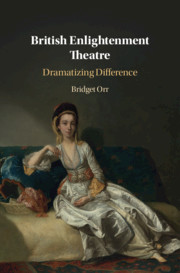Book contents
- British Enlightenment Theatre
- British Enlightenment Theatre
- Copyright page
- Dedication
- Contents
- Illustrations
- Acknowledgements
- Introduction: Dramatizing Enlightenment
- Chapter 1 Addison, Steele and Enlightened Sentiment
- Chapter 2 Fair Captives and Spiritual Dragooning
- Chapter 3 The Black Legend, Noble Savagery and Indigenous Voice
- Chapter 4 The Masonic Invention of Domestic Tragedy
- Chapter 5 Local Savagery
- Afterword
- Bibliography
- Index
Chapter 4 - The Masonic Invention of Domestic Tragedy
Published online by Cambridge University Press: 21 December 2019
- British Enlightenment Theatre
- British Enlightenment Theatre
- Copyright page
- Dedication
- Contents
- Illustrations
- Acknowledgements
- Introduction: Dramatizing Enlightenment
- Chapter 1 Addison, Steele and Enlightened Sentiment
- Chapter 2 Fair Captives and Spiritual Dragooning
- Chapter 3 The Black Legend, Noble Savagery and Indigenous Voice
- Chapter 4 The Masonic Invention of Domestic Tragedy
- Chapter 5 Local Savagery
- Afterword
- Bibliography
- Index
Summary
Freemasonry emerged in London in the late 1710s as a form of sociability committed to tolerant, cosmopolitan constitutionalism of a characteristically Enlightenment cast. Welcoming to Jews and Catholics, and men of varying social class, the lodges were also frequented by many, quite probably a majority of, male theatre professionals. Among the famous actors, managers and dramatists, the masons counted George Lillo. My contention is that it is no accident that all the most important contributors to domestic tragedy were masons (Hill, Lillo, Moore) but that their generic innovations crafted a genre peculiarly able to represent the shocks of commercial capital and colonial trade on individuals sutured from traditional forms of familial and kinship network and support. The fraternal assistance of the lodge stood as an alternative source of succour in a hostile world, even if it often failed to rescue its fallen brothers. Lillo wrote The Tragedy of George Barnwell in the same year he joined a lodge, and his drama symbolically enacts the challenges and comforts of masonic fraternity.
Keywords
- Type
- Chapter
- Information
- British Enlightenment TheatreDramatizing Difference, pp. 154 - 187Publisher: Cambridge University PressPrint publication year: 2020



